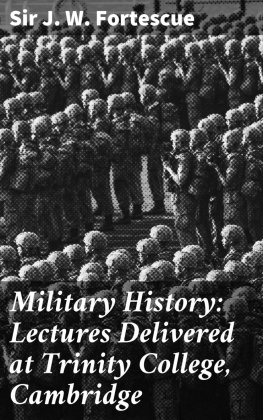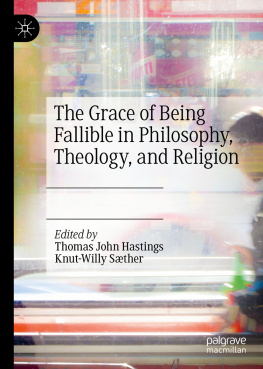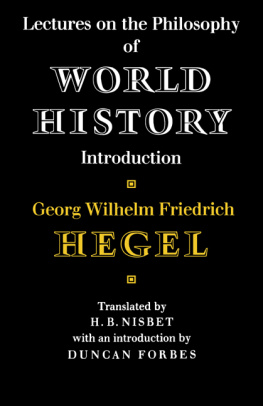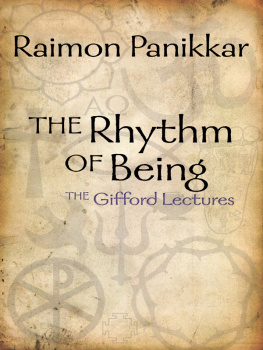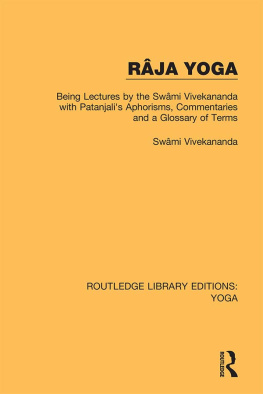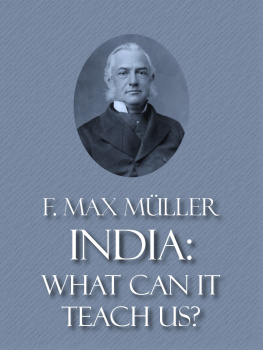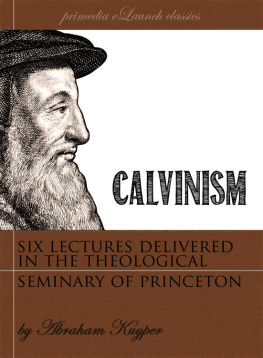Hastings Rashdall - Philosophy and Religion / Six Lectures Delivered at Cambridge
Here you can read online Hastings Rashdall - Philosophy and Religion / Six Lectures Delivered at Cambridge full text of the book (entire story) in english for free. Download pdf and epub, get meaning, cover and reviews about this ebook. year: 1909, publisher: London: Duckworth & Co, genre: Science. Description of the work, (preface) as well as reviews are available. Best literature library LitArk.com created for fans of good reading and offers a wide selection of genres:
Romance novel
Science fiction
Adventure
Detective
Science
History
Home and family
Prose
Art
Politics
Computer
Non-fiction
Religion
Business
Children
Humor
Choose a favorite category and find really read worthwhile books. Enjoy immersion in the world of imagination, feel the emotions of the characters or learn something new for yourself, make an fascinating discovery.
- Book:Philosophy and Religion / Six Lectures Delivered at Cambridge
- Author:
- Publisher:London: Duckworth & Co
- Genre:
- Year:1909
- Rating:3 / 5
- Favourites:Add to favourites
- Your mark:
- 60
- 1
- 2
- 3
- 4
- 5
Philosophy and Religion / Six Lectures Delivered at Cambridge: summary, description and annotation
We offer to read an annotation, description, summary or preface (depends on what the author of the book "Philosophy and Religion / Six Lectures Delivered at Cambridge" wrote himself). If you haven't found the necessary information about the book — write in the comments, we will try to find it.
Philosophy and Religion / Six Lectures Delivered at Cambridge — read online for free the complete book (whole text) full work
Below is the text of the book, divided by pages. System saving the place of the last page read, allows you to conveniently read the book "Philosophy and Religion / Six Lectures Delivered at Cambridge" online for free, without having to search again every time where you left off. Put a bookmark, and you can go to the page where you finished reading at any time.
Font size:
Interval:
Bookmark:
The Project Gutenberg eBook, Philosophy and Religion, by Hastings Rashdall
This eBook is for the use of anyone anywhere at no cost and withalmost no restrictions whatsoever. You may copy it, give it away orre-use it under the terms of the Project Gutenberg License includedwith this eBook or online at www.gutenberg.org
Title: Philosophy and Religion Six Lectures Delivered at Cambridge
Author: Hastings Rashdall
Release Date: July 4, 2007 [eBook #21995]
Language: English
***START OF THE PROJECT GUTENBERG EBOOK PHILOSOPHY AND RELIGION***
E-text prepared by Al Haines
Transcriber's note:
Page numbers in this book are indicated by numbers enclosed in curly braces, e.g. {99}. They have been located where page breaks occurred in the original book.
Six Lectures Delivered at Cambridge
by
D. Litt. (Oxon.), D.C.L. (Dunelm.)
Fellow of the British Academy
Fellow and Tutor of New College, Oxford
London: Duckworth & Co.
3 Henrietta St. Covent Garden
1909
All rights reserved
{v}
Man has no deeper or wider interest than theology; none deeper, forhowever much he may change, he never loses his love of the manyquestions it covers; and none wider, for under whatever law he may livehe never escapes from its spacious shade; nor does he ever find that itspeaks to him in vain or uses a voice that fails to reach him. Oncethe present writer was talking with a friend who has equal fame as astatesman and a man of letters, and he said, 'Every day I live,Politics, which are affairs of Man and Time, interest me less, whileTheology, which is an affair of God and Eternity, interests me more.'As with him, so with many, though the many feel that their interest isin theology and not in dogma. Dogma, they know, is but a series ofresolutions framed by a council or parliament, which they do notrespect any the more because the parliament was composed ofecclesiastically-minded persons; while the theology which so intereststhem is a discourse touching God, though the Being so named is the Godman conceived as not only related to himself and his world but also asrising ever higher with the notions of the self and the world. Wisebooks, not in dogma but in theology, may therefore be described as thesupreme {vi} need of our day, for only such can save us from muchfanaticism and secure us in the full possession of a sober and sanereason.
Theology is less a single science than an encyclopaedia of sciences;indeed all the sciences which have to do with man have a better rightto be called theological than anthropological, though the man itstudies is not simply an individual but a race. Its way of viewing manis indeed characteristic; from this have come some of its brighterideals and some of its darkest dreams. The ideals are all eitherethical or social, and would make of earth a heaven, creatingfraternity amongst men and forming all states into a goodly sisterhood;the dreams may be represented by doctrines which concern sin on the oneside and the will of God on the other. But even this will cannot makesin luminous, for were it made radiant with grace, it would cease to besin.
These books then,which have all to be written by men who have livedin the full blaze of modern light,though without having either theireyes burned out or their souls scorched into insensibility,areintended to present God in relation to Man and Man in relation to God.It is intended that they begin, not in date of publication, but inorder of thought, with a Theological Encyclopaedia which shall show thecircle of sciences co-ordinated under the term Theology, though allwill be viewed as related to its central or main idea. This relationof God to human knowledge will then be looked at through mind as acommunion of Deity with humanity, or God in fellowship {vii} withconcrete man. On this basis the idea of Revelation will be dealt with.Then, so far as history and philology are concerned, the two SacredBooks, which are here most significant, will be viewed as the scholar,who is also a divine, views them; in other words, the Old and NewTestaments, regarded as human documents, will be criticised as aliterature which expresses relations to both the present and thefuture; that is, to the men and races who made the books, as well as tothe races and men the books made. The Bible will thus be studied inthe Semitic family which gave it being, and also in the Indo-Europeanfamilies which gave to it the quality of the life to which they haveattained. But Theology has to do with more than sacred literature; ithas also to do with the thoughts and life its history occasioned.Therefore the Church has to be studied and presented as an institutionwhich God founded and man administers. But it is possible to know thisChurch only through the thoughts it thinks, the doctrines it holds, thecharacters and the persons it forms, the people who are its saints andembody its ideals of sanctity, the acts it does, which are itssacraments, and the laws it follows and enforces, which are its polity,and the young it educates and the nations it directs and controls.These are the points to be presented in the volumes which follow, whichare all to be occupied with theology or the knowledge of God and Hisways.
{ix}
These Lectures were delivered in Cambridge during the Lent Term of lastyear, on the invitation of a Committee presided over by the Master ofMagdalene, before an audience of from three hundred to four hundredUniversity men, chiefly Under-graduates. They were not then, and theyare not now, intended for philosophers or even for beginners in thesystematic study of philosophy, but as aids to educated men desirous ofthinking out for themselves a reasonable basis for personal Religion.
The Lecturesespecially the first threedeal with questions on whichI have already written. I am indebted to the Publisher of ContentioVeritatis and the other contributors to that volume for raising noobjection to my publishing Lectures which might possibly be regarded asin part a condensation, in part an expansion of my Essay on 'Theultimate basis of Theism.' I have dealt more systematically with manyof the problems here discussed in an Essay upon 'Personality in God andMan' contributed to Personal Idealism (edited by Henry {x} Sturt) andin my 'Theory of Good and Evil.' Some of the doctrinal questionstouched on in Lecture VI. have been more fully dealt with in my volumeof University Sermons, Doctrine and Development.
Questions which were asked at the time and communications which havesince reached me have made me feel, more even than I did when I waswriting the Lectures, how inadequate is the treatment here given tomany great problems. On some matters much fuller explanation anddiscussion will naturally be required to convince persons previouslyunfamiliar with Metaphysic: on others it is the more advanced studentof Philosophy who will complain that I have only touched upon thefringe of a vast subject. But I have felt that I could not seriouslyexpand any part of the Lectures without changing the whole character ofthe book, and I have been compelled in general to meet the demand forfurther explanation only by the above general reference to my otherbooks, by the addition of a few notes, and by appending to each chaptersome suggestions for more extended reading. These might of course havebeen indefinitely enlarged, but a long list of books is apt to defeatits own purpose: people with a limited time at their disposal want toknow which book to make a beginning upon.
The Lectures are therefore published for the most {xi} part just asthey were delivered, in the hope that they may suggest lines of thoughtwhich may be intellectually and practically useful. I trust that anyphilosopher who may wish to take serious notice of my viewsespeciallythe metaphysical views expressed in the first few chapterswill begood enough to remember that the expression of them is avowedlyincomplete and elementary, and cannot fairly be criticized in muchdetail without reference to my other writings.
Next pageFont size:
Interval:
Bookmark:
Similar books «Philosophy and Religion / Six Lectures Delivered at Cambridge»
Look at similar books to Philosophy and Religion / Six Lectures Delivered at Cambridge. We have selected literature similar in name and meaning in the hope of providing readers with more options to find new, interesting, not yet read works.
Discussion, reviews of the book Philosophy and Religion / Six Lectures Delivered at Cambridge and just readers' own opinions. Leave your comments, write what you think about the work, its meaning or the main characters. Specify what exactly you liked and what you didn't like, and why you think so.


